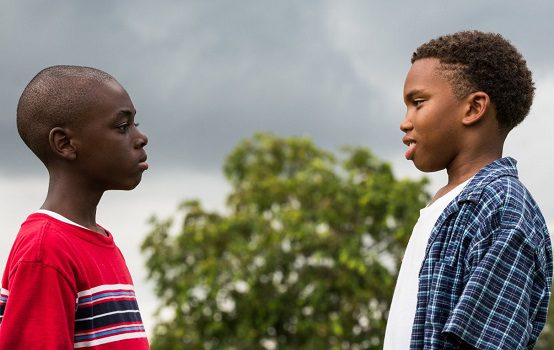At the Movies on Election Night

The hours between the end of the workday Tuesday and the start of polls reporting the election’s results presented me with a choice: I could stew in anxiety over the future of the country during these hours, or I could go see a movie. If you’re familiar with my shtick by now, you probably don’t need me to tell you this was an easy decision to make.
I went to see Moonlight, the new film from American director and writer Barry Jenkins, for the second time in five days. On the surface of things, Moonlight is the kind of movie that checks all the appropriate boxes for appealing to that liberal, multicultural crowd we write so much about around these parts. It’s a tripartite story of Chiron, a black man growing up in Miami at the height of its drug crisis and grappling through the years with the absence of steadily present parental figures in his life—as well as the bullying, awkward sexual encounters, and midlife melancholy that accompanies being gay. It sounds like the perfect film for some Ivy League Theories and Methods of Intersectional Representation 101 course, which, of course, marks it for easy dismissal among the conservative crowd as Look What They’re Teaching the Kids at SJW U: The Movie.
The first time I watched Moonlight I did so in the fear that it would turn out to be the sort of aggressively political movie that would invite those kinds of criticisms from the right. It wasn’t. Thus the second time around I could watch the movie free from the attendant stress of anticipating what it might end up being and was free to focus on what it simply is.
Even though the narrative content of the film is highly specific and personal—Barry Jenkins, though straight, grew up a block away from the apartment used in the film and was himself raised, or whatever the more accurate verb would be, by a crack-addicted mother—the way the film unfolds itself invites viewers of any stripe into the contemplative space that Jenkins has created. The way Jenkins uses sound and color to evoke emotions otherwise elusive to language, as in one powerful scene where a nine-year-old Chiron receives a verbal beating from his mother in a neon-baked hallway with classical music taking the place of diegetic screaming, is beautiful in its own right. But even more riveting is the way the film’s triptych structure condenses narrative time to show not only how powerfully childhood traumas—those of others as well as our own—can shape a person later in life, but also just how quickly the interstitial time between adolescence and maturity really elapses.
All this was on my mind when I awoke to a president-elect Trump on Wednesday morning. Though I could in one sense breathe a bit easier, with all taxing months of hyperspeculative hand-wringing over which bad option America was going to choose for themselves finally over, I couldn’t sit back and start hoping for the best possible version of this presidency, as some at this site have done.
The traumatic shock that Rod Dreher, among others, has recorded as having rippled across the world of the liberal, multicultural elite hits too close to home for me to take unseriously or uncharitably. I was educated in the world of the liberal, multicultural elite. On Wednesday, I immediately had to face the palpable anger, fear, and despair, of the many, many immigrant, children-of-immigrant, gay, black, Muslim, Jewish friends I’ve welcomed into my life the last five years—the very people who now suddenly feel very much unwelcome in the country they as recently as Monday could call home.
Conservatives sympathetic to part or all of Trump’s platform rest on their laurels today at their own peril. The traumas being forged in the hearts of so many young people this week are going to leave a lasting scar that will still be around in 8, 12, 16 years. A conservatism that fails to acknowledge the very real hurting of the people it so infrequently gives voice to is going to face extinction if the principles it holds out to a new generation are presented as a crown of thorns rather than an olive branch.
I’m still working my way through what I can do to help the healing that so obviously, to me at least, needs to start happening if we are to survive as a country together. For now, I can fall back on what, as a film critic, I know how to do best and offer a recommendation for your weekend. Go see Moonlight. Like all good art, it provides a clear window into another human being’s soul. Like all great art, it also holds up a mirror to our own.
Tim Markatos is an editorial fellow at The American Conservative.
Comments